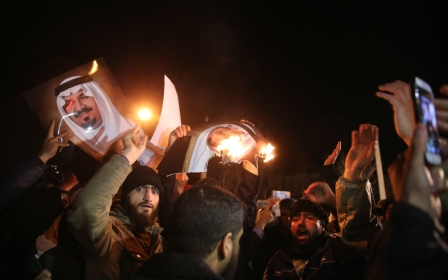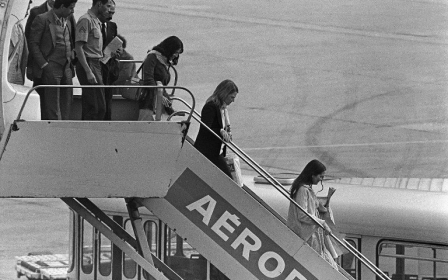Iran-Saudi clash: The tide turns against Riyadh

On the face of it, Saudi Arabia has been able to call upon a range of friends to come to its defence in its latest conflict with Iran, provoked by the surprise execution of Shia religious scholar Nimr al-Nimr. Indeed, they appear to have enabled a Saudi offensive action to corner Tehran and present it before the Americans as the true outcast, rejected by all the Muslims except a few of its Shia puppets.
A number of countries followed Riyadh in breaking diplomatic ties with the Iranians. An emergency Gulf Cooperation Council and Arab League meetings of foreign ministers were quickly assembled at which Saudi Minister of Foreign Affairs Adel al-Jubeir warned darkly of “additional measures” under consideration if Iran didn’t behave, and Saudi and Gulf-dominated pan-Arab media kicked into overdrive against the menace of the mullahs.
Jamal Khashoggi, an important Saudi propagandist, declared that Muslim countries had to decide if they were “with us or against us” in the face of the new Nazis. “We are living [in] the atmosphere of 1939 Europe when Hitler invaded Poland,” he declared. “The Europe that wanted to stay free lost its patience. Of course they did not want war but they also did not want to be Hitler’s next victim . . . The Islamic world is before a similar choice today.”
And what does this modern Muslim Hitler want? To force all Muslims to surrender to the authority of the Supreme Leader in Tehran, “who claims that he alone represents the truth and speaks in the name of God”. It was as if the Iranian revolution had happened last week, and not a perhaps predictable repeat of the 1988 storming of the Saudi embassy.
However, despite this rhetoric, the solidarity with Riyadh is not quite what it appears to be. The only countries to completely sever diplomatic links were small states seeking the protection or other favours from Saudi Arabia: Bahrain, Sudan, Somalia and Djibouti, which an Iranian government spokesman mocked, saying the Saudi diplomatic war was not of concern, “even if this move is backed by the great country of Djibouti”.
More importantly, Kuwait, Qatar and the UAE only scaled down ties. This position only makes sense because, with the sanctions regime on the verge of ending, commercial opportunities are opening with Tehran. Not only that: Iran’s gain could be Gulf countries’ loss if foreign businesses decide to quit their presence in countries of several million people for a market of 80 million and that’s not desirable as the fact of lower oil prices begins to cast a pall over Gulf economies.
Indeed, the Western reaction to the squabble between Riyadh and Tehran has been notable for the blame being directed the Saudi leadership’s way. US Secretary of State John Kerry appeared to go out of his way to state that the sanctions were on track to being lifted, confirming the fact that, for the Obama administration in its last year of office, assuring the Iran Joint Comprehensive Plan of Action is implemented remains a foreign policy priority.
In other words, for both the US and Iran, Saudi Arabia has become a distraction. It is probably overstating things to suggest that Riyadh believes it can stop the terms of the deal unfolding, but the events of the past week indicate that the Saudi regime has at least the desire to wreck the china shop.
What is disturbing is that while the US has operated on the basis of a hands-off approach located in its new “pivot to Asia”, it has indulged the Saudi leadership with more and more weaponry and enabling of its policies in Yemen, creating death and destruction, in Bahrain, ruining a popular movement for political and economic rights, and and in Syria, reproducing Baath dystopia in the form of the jihadists.
There is some merit in Obama’s evident inclination to leave the region to sort out its own problems, to find its own balance of political, social and economic forces without the intervention of outside influence. He has suggested that the real challenge to the Saudi regime is not to be found externally, but domestically.
Indeed, if Al-Saud did not have the Islamic republic to hate right now, perhaps they would have been obliged to invent it. The Iranian Other has provided a convenient cause against which to rally the religious scholars and the general public behind the new leadership of King Salman and his son Mohammed, who as deputy crown prince has been given so much power. It gives the regime the leverage to effect some fiscal tightening to weather the oil price plunge.
The wider significance of the Nimr affair remains, however, that we are dealing with a very different Saudi Arabia today to the one that tussled with the Islamic republic in the 1980s, that rebuilt its relationship with the West after the denouement of 9/11 and opened up to the world, and that happily and surreptitiously helped the US invade Iraq.
The empowerment of Arab Shia communities (a problem of foreign policy), the spread of universalised expectations of governance brought on by globalisation and the information technology revolution (a problem of domestic politics), and the problem of generational change within the ruling family have all changed the game (a problem of leadership).
Rather than a force for stability, Saudi Arabia is coming to be seen by Western policy makers as a problem causer. The shift is gradual, but there have been many signs of it: leaked opinions of German intelligence services, the heightened PR efforts of Saudi officials and semi-officials in Western media, even the presence of Saudi Arabia on the list of shibboleths of political correctness that Donald Trump wants to take down.
In a sense, Saudi Arabia may come to give the impression of a power in decline, and all the more unpredictable for it. One reason why its histrionic wrangle with Iran these past weeks bears a faint trace of irrelevance.
- Andrew Hammond is a senior policy fellow for the European Council on Foreign Relations' Middle East & North Africa programme. Andrew previously worked as a journalist with BBC Arabic radio. He was a founding member of the Cairo Times news magazine. He spent ten years working as a correspondent for Reuters, including a stint as Reuters bureau chief in Riyadh from 2006 to 2009. He has covered the Arab Spring uprisings in Egypt, Tunisia, Bahrain, Yemen and Morocco and reported from Iraq before and after the overthrow of Saddam Hussein.
The views expressed in this article belong to the author and do not necessarily reflect the editorial policy of Middle East Eye.
Photo: A meeting of the Arab League to discuss the Saudi Iran diplomatic crisis on 12 January following the Saudi execution of Shia cleric Nimr al-Nimr on 1 January and the storming of the Saudi embassy in Tehran (AFP)
Stay informed with MEE's newsletters
Sign up to get the latest alerts, insights and analysis, starting with Turkey Unpacked
Middle East Eye delivers independent and unrivalled coverage and analysis of the Middle East, North Africa and beyond. To learn more about republishing this content and the associated fees, please fill out this form. More about MEE can be found here.





